An Analysis of Brexit's Economic and Political Consequences for the UK
VerifiedAdded on 2023/01/11
|7
|2011
|80
Report
AI Summary
This report delves into the multifaceted impact of Brexit on the United Kingdom, examining its effects on foreign investment, technological advancements, and the availability of skilled labor. It presents a comprehensive analysis of the UK's economic landscape post-Brexit, highlighting the challenges and opportunities that have emerged since the country's departure from the European Union. The report uses real-world examples to illustrate the positive and negative consequences of Brexit, providing insights into the evolving economic and political dynamics of the UK. Furthermore, it discusses the implications of Brexit on the UK's parliamentary sovereignty. The report also highlights the importance of foreign investment for the UK and the government's efforts to attract it. It also discusses the challenges faced by the UK in terms of technology and skilled workers. In conclusion, the report provides a balanced perspective on the impact of Brexit, offering a nuanced understanding of the UK's current situation.

WORD
Paraphrase This Document
Need a fresh take? Get an instant paraphrase of this document with our AI Paraphraser
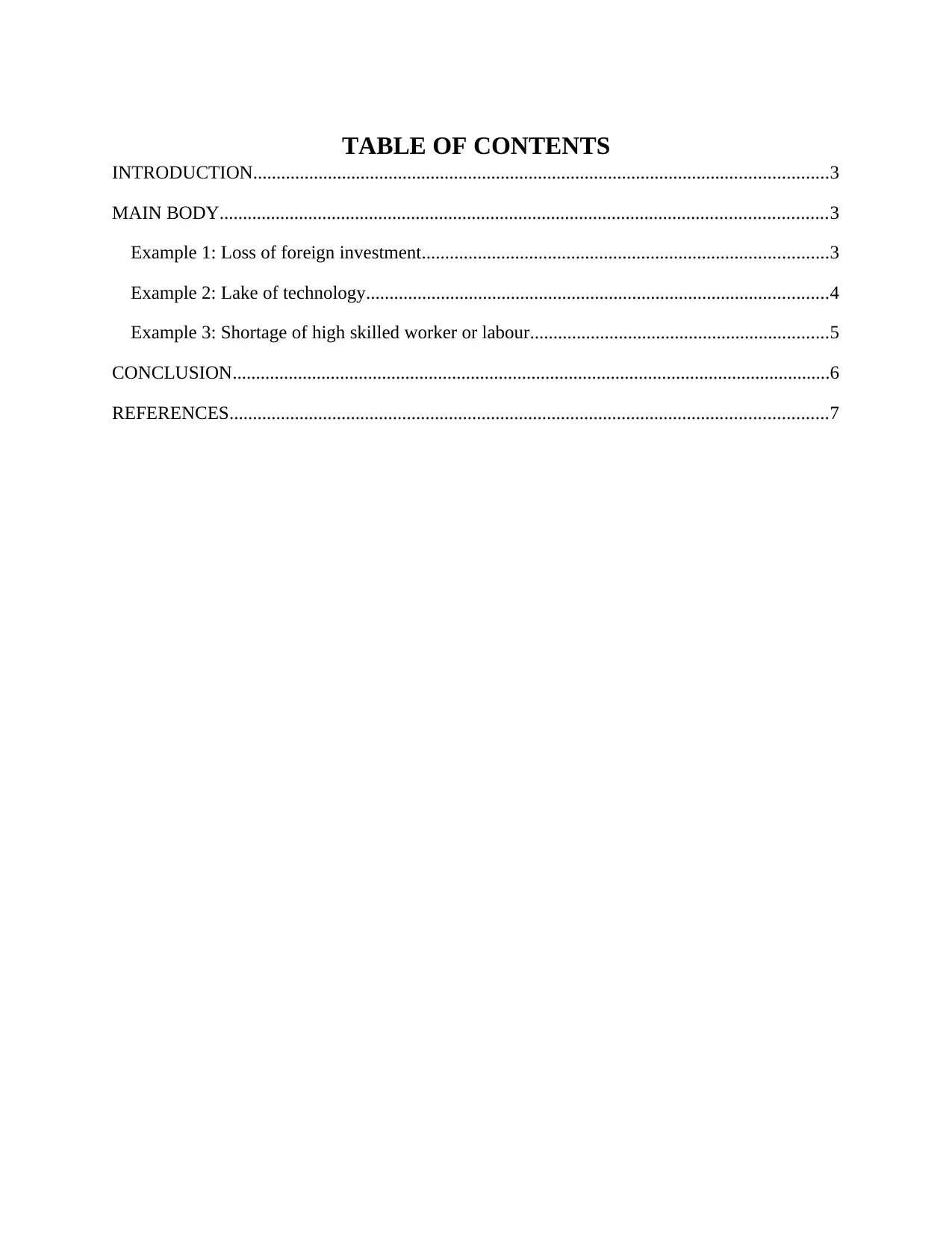
TABLE OF CONTENTS
INTRODUCTION...........................................................................................................................3
MAIN BODY..................................................................................................................................3
Example 1: Loss of foreign investment.......................................................................................3
Example 2: Lake of technology...................................................................................................4
Example 3: Shortage of high skilled worker or labour................................................................5
CONCLUSION................................................................................................................................6
REFERENCES................................................................................................................................7
INTRODUCTION...........................................................................................................................3
MAIN BODY..................................................................................................................................3
Example 1: Loss of foreign investment.......................................................................................3
Example 2: Lake of technology...................................................................................................4
Example 3: Shortage of high skilled worker or labour................................................................5
CONCLUSION................................................................................................................................6
REFERENCES................................................................................................................................7
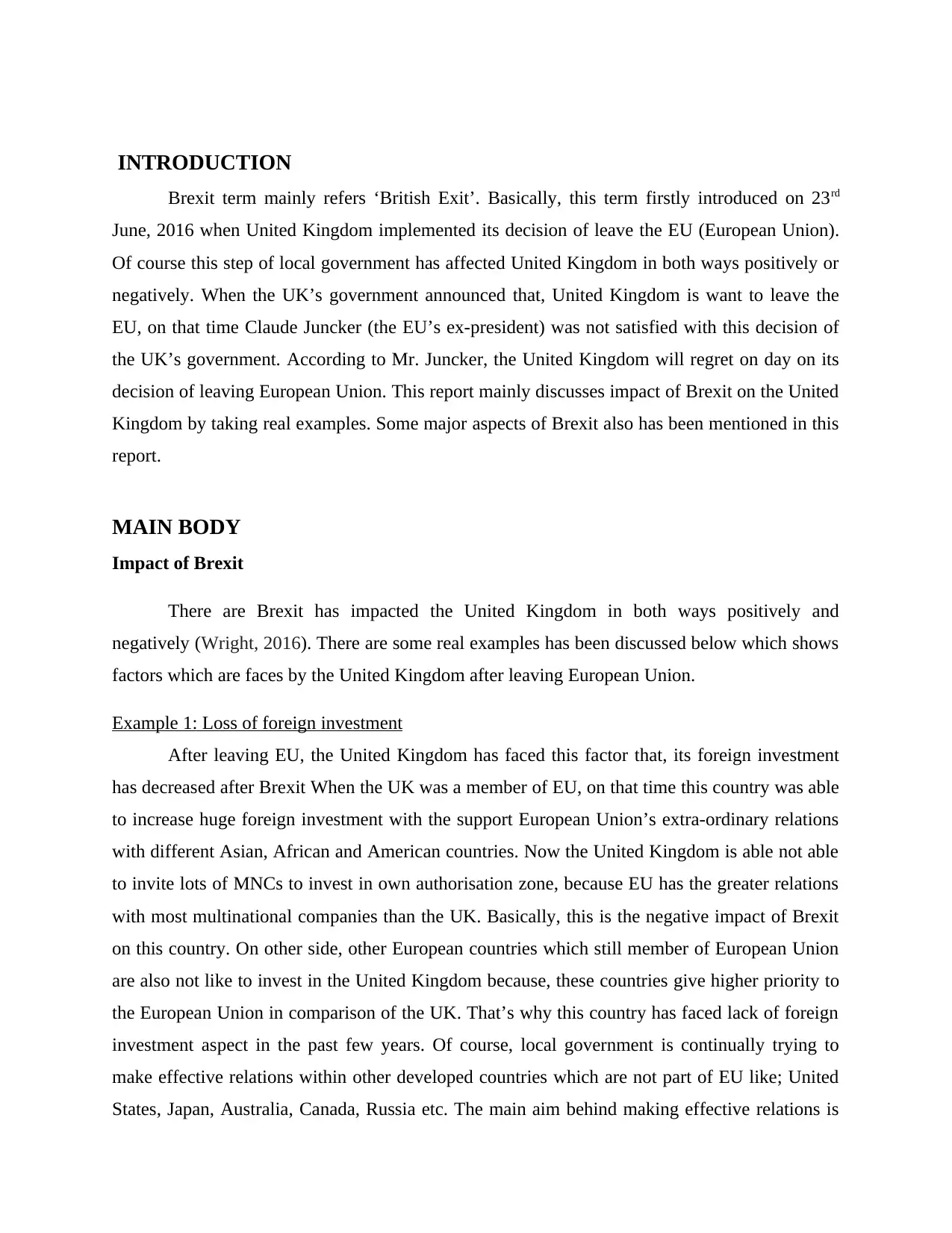
INTRODUCTION
Brexit term mainly refers ‘British Exit’. Basically, this term firstly introduced on 23rd
June, 2016 when United Kingdom implemented its decision of leave the EU (European Union).
Of course this step of local government has affected United Kingdom in both ways positively or
negatively. When the UK’s government announced that, United Kingdom is want to leave the
EU, on that time Claude Juncker (the EU’s ex-president) was not satisfied with this decision of
the UK’s government. According to Mr. Juncker, the United Kingdom will regret on day on its
decision of leaving European Union. This report mainly discusses impact of Brexit on the United
Kingdom by taking real examples. Some major aspects of Brexit also has been mentioned in this
report.
MAIN BODY
Impact of Brexit
There are Brexit has impacted the United Kingdom in both ways positively and
negatively (Wright, 2016). There are some real examples has been discussed below which shows
factors which are faces by the United Kingdom after leaving European Union.
Example 1: Loss of foreign investment
After leaving EU, the United Kingdom has faced this factor that, its foreign investment
has decreased after Brexit When the UK was a member of EU, on that time this country was able
to increase huge foreign investment with the support European Union’s extra-ordinary relations
with different Asian, African and American countries. Now the United Kingdom is able not able
to invite lots of MNCs to invest in own authorisation zone, because EU has the greater relations
with most multinational companies than the UK. Basically, this is the negative impact of Brexit
on this country. On other side, other European countries which still member of European Union
are also not like to invest in the United Kingdom because, these countries give higher priority to
the European Union in comparison of the UK. That’s why this country has faced lack of foreign
investment aspect in the past few years. Of course, local government is continually trying to
make effective relations within other developed countries which are not part of EU like; United
States, Japan, Australia, Canada, Russia etc. The main aim behind making effective relations is
Brexit term mainly refers ‘British Exit’. Basically, this term firstly introduced on 23rd
June, 2016 when United Kingdom implemented its decision of leave the EU (European Union).
Of course this step of local government has affected United Kingdom in both ways positively or
negatively. When the UK’s government announced that, United Kingdom is want to leave the
EU, on that time Claude Juncker (the EU’s ex-president) was not satisfied with this decision of
the UK’s government. According to Mr. Juncker, the United Kingdom will regret on day on its
decision of leaving European Union. This report mainly discusses impact of Brexit on the United
Kingdom by taking real examples. Some major aspects of Brexit also has been mentioned in this
report.
MAIN BODY
Impact of Brexit
There are Brexit has impacted the United Kingdom in both ways positively and
negatively (Wright, 2016). There are some real examples has been discussed below which shows
factors which are faces by the United Kingdom after leaving European Union.
Example 1: Loss of foreign investment
After leaving EU, the United Kingdom has faced this factor that, its foreign investment
has decreased after Brexit When the UK was a member of EU, on that time this country was able
to increase huge foreign investment with the support European Union’s extra-ordinary relations
with different Asian, African and American countries. Now the United Kingdom is able not able
to invite lots of MNCs to invest in own authorisation zone, because EU has the greater relations
with most multinational companies than the UK. Basically, this is the negative impact of Brexit
on this country. On other side, other European countries which still member of European Union
are also not like to invest in the United Kingdom because, these countries give higher priority to
the European Union in comparison of the UK. That’s why this country has faced lack of foreign
investment aspect in the past few years. Of course, local government is continually trying to
make effective relations within other developed countries which are not part of EU like; United
States, Japan, Australia, Canada, Russia etc. The main aim behind making effective relations is
⊘ This is a preview!⊘
Do you want full access?
Subscribe today to unlock all pages.

Trusted by 1+ million students worldwide
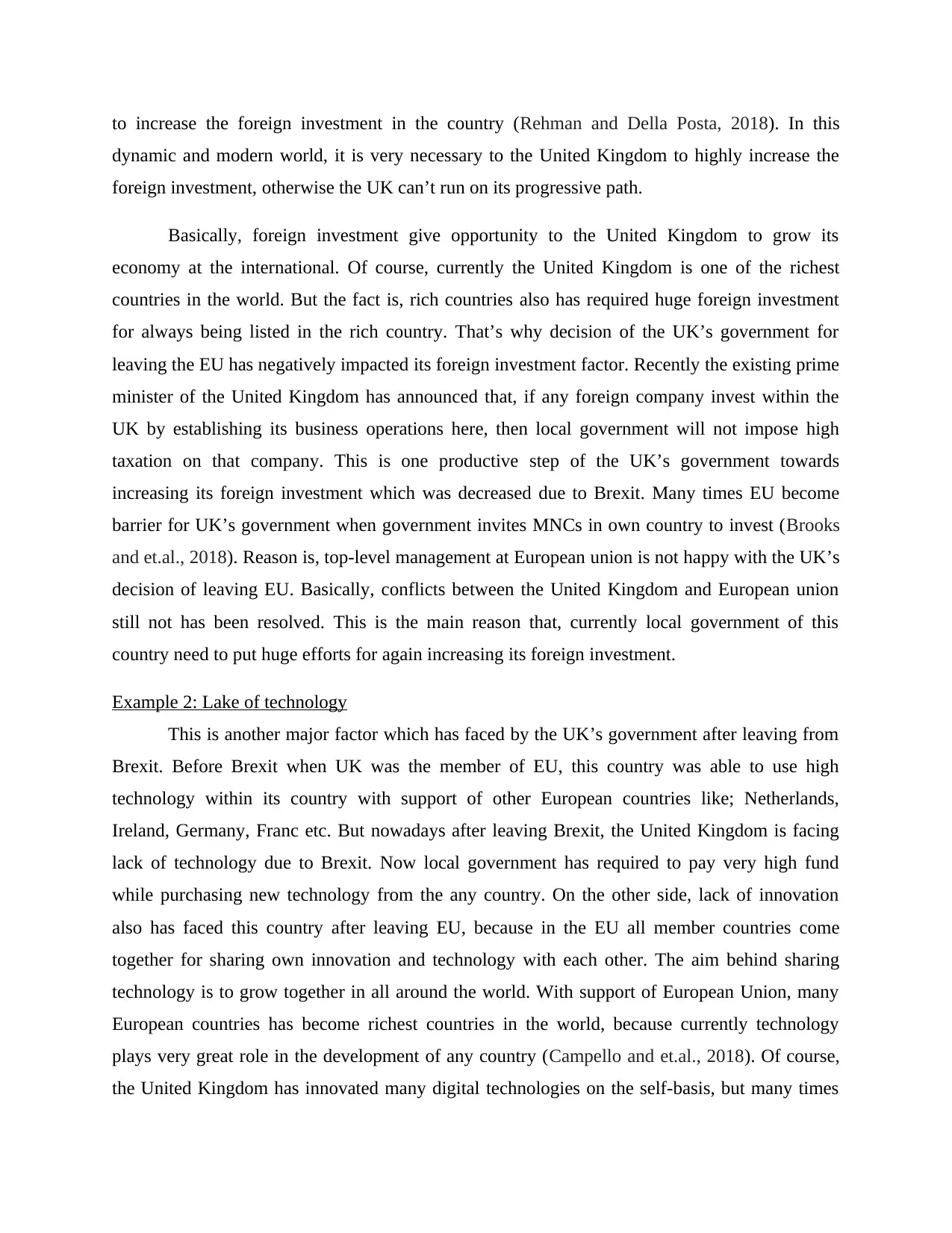
to increase the foreign investment in the country (Rehman and Della Posta, 2018). In this
dynamic and modern world, it is very necessary to the United Kingdom to highly increase the
foreign investment, otherwise the UK can’t run on its progressive path.
Basically, foreign investment give opportunity to the United Kingdom to grow its
economy at the international. Of course, currently the United Kingdom is one of the richest
countries in the world. But the fact is, rich countries also has required huge foreign investment
for always being listed in the rich country. That’s why decision of the UK’s government for
leaving the EU has negatively impacted its foreign investment factor. Recently the existing prime
minister of the United Kingdom has announced that, if any foreign company invest within the
UK by establishing its business operations here, then local government will not impose high
taxation on that company. This is one productive step of the UK’s government towards
increasing its foreign investment which was decreased due to Brexit. Many times EU become
barrier for UK’s government when government invites MNCs in own country to invest (Brooks
and et.al., 2018). Reason is, top-level management at European union is not happy with the UK’s
decision of leaving EU. Basically, conflicts between the United Kingdom and European union
still not has been resolved. This is the main reason that, currently local government of this
country need to put huge efforts for again increasing its foreign investment.
Example 2: Lake of technology
This is another major factor which has faced by the UK’s government after leaving from
Brexit. Before Brexit when UK was the member of EU, this country was able to use high
technology within its country with support of other European countries like; Netherlands,
Ireland, Germany, Franc etc. But nowadays after leaving Brexit, the United Kingdom is facing
lack of technology due to Brexit. Now local government has required to pay very high fund
while purchasing new technology from the any country. On the other side, lack of innovation
also has faced this country after leaving EU, because in the EU all member countries come
together for sharing own innovation and technology with each other. The aim behind sharing
technology is to grow together in all around the world. With support of European Union, many
European countries has become richest countries in the world, because currently technology
plays very great role in the development of any country (Campello and et.al., 2018). Of course,
the United Kingdom has innovated many digital technologies on the self-basis, but many times
dynamic and modern world, it is very necessary to the United Kingdom to highly increase the
foreign investment, otherwise the UK can’t run on its progressive path.
Basically, foreign investment give opportunity to the United Kingdom to grow its
economy at the international. Of course, currently the United Kingdom is one of the richest
countries in the world. But the fact is, rich countries also has required huge foreign investment
for always being listed in the rich country. That’s why decision of the UK’s government for
leaving the EU has negatively impacted its foreign investment factor. Recently the existing prime
minister of the United Kingdom has announced that, if any foreign company invest within the
UK by establishing its business operations here, then local government will not impose high
taxation on that company. This is one productive step of the UK’s government towards
increasing its foreign investment which was decreased due to Brexit. Many times EU become
barrier for UK’s government when government invites MNCs in own country to invest (Brooks
and et.al., 2018). Reason is, top-level management at European union is not happy with the UK’s
decision of leaving EU. Basically, conflicts between the United Kingdom and European union
still not has been resolved. This is the main reason that, currently local government of this
country need to put huge efforts for again increasing its foreign investment.
Example 2: Lake of technology
This is another major factor which has faced by the UK’s government after leaving from
Brexit. Before Brexit when UK was the member of EU, this country was able to use high
technology within its country with support of other European countries like; Netherlands,
Ireland, Germany, Franc etc. But nowadays after leaving Brexit, the United Kingdom is facing
lack of technology due to Brexit. Now local government has required to pay very high fund
while purchasing new technology from the any country. On the other side, lack of innovation
also has faced this country after leaving EU, because in the EU all member countries come
together for sharing own innovation and technology with each other. The aim behind sharing
technology is to grow together in all around the world. With support of European Union, many
European countries has become richest countries in the world, because currently technology
plays very great role in the development of any country (Campello and et.al., 2018). Of course,
the United Kingdom has innovated many digital technologies on the self-basis, but many times
Paraphrase This Document
Need a fresh take? Get an instant paraphrase of this document with our AI Paraphraser
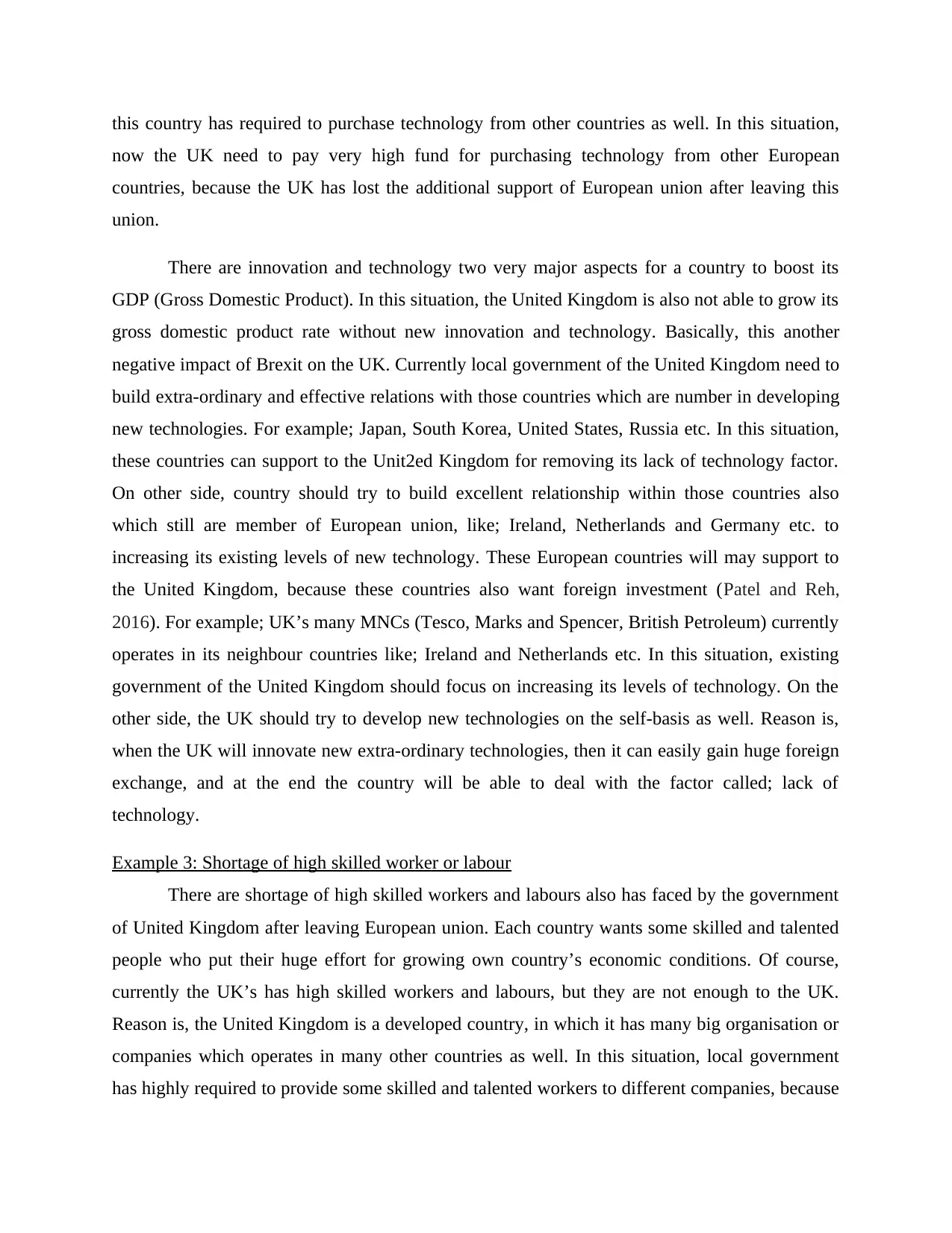
this country has required to purchase technology from other countries as well. In this situation,
now the UK need to pay very high fund for purchasing technology from other European
countries, because the UK has lost the additional support of European union after leaving this
union.
There are innovation and technology two very major aspects for a country to boost its
GDP (Gross Domestic Product). In this situation, the United Kingdom is also not able to grow its
gross domestic product rate without new innovation and technology. Basically, this another
negative impact of Brexit on the UK. Currently local government of the United Kingdom need to
build extra-ordinary and effective relations with those countries which are number in developing
new technologies. For example; Japan, South Korea, United States, Russia etc. In this situation,
these countries can support to the Unit2ed Kingdom for removing its lack of technology factor.
On other side, country should try to build excellent relationship within those countries also
which still are member of European union, like; Ireland, Netherlands and Germany etc. to
increasing its existing levels of new technology. These European countries will may support to
the United Kingdom, because these countries also want foreign investment (Patel and Reh,
2016). For example; UK’s many MNCs (Tesco, Marks and Spencer, British Petroleum) currently
operates in its neighbour countries like; Ireland and Netherlands etc. In this situation, existing
government of the United Kingdom should focus on increasing its levels of technology. On the
other side, the UK should try to develop new technologies on the self-basis as well. Reason is,
when the UK will innovate new extra-ordinary technologies, then it can easily gain huge foreign
exchange, and at the end the country will be able to deal with the factor called; lack of
technology.
Example 3: Shortage of high skilled worker or labour
There are shortage of high skilled workers and labours also has faced by the government
of United Kingdom after leaving European union. Each country wants some skilled and talented
people who put their huge effort for growing own country’s economic conditions. Of course,
currently the UK’s has high skilled workers and labours, but they are not enough to the UK.
Reason is, the United Kingdom is a developed country, in which it has many big organisation or
companies which operates in many other countries as well. In this situation, local government
has highly required to provide some skilled and talented workers to different companies, because
now the UK need to pay very high fund for purchasing technology from other European
countries, because the UK has lost the additional support of European union after leaving this
union.
There are innovation and technology two very major aspects for a country to boost its
GDP (Gross Domestic Product). In this situation, the United Kingdom is also not able to grow its
gross domestic product rate without new innovation and technology. Basically, this another
negative impact of Brexit on the UK. Currently local government of the United Kingdom need to
build extra-ordinary and effective relations with those countries which are number in developing
new technologies. For example; Japan, South Korea, United States, Russia etc. In this situation,
these countries can support to the Unit2ed Kingdom for removing its lack of technology factor.
On other side, country should try to build excellent relationship within those countries also
which still are member of European union, like; Ireland, Netherlands and Germany etc. to
increasing its existing levels of new technology. These European countries will may support to
the United Kingdom, because these countries also want foreign investment (Patel and Reh,
2016). For example; UK’s many MNCs (Tesco, Marks and Spencer, British Petroleum) currently
operates in its neighbour countries like; Ireland and Netherlands etc. In this situation, existing
government of the United Kingdom should focus on increasing its levels of technology. On the
other side, the UK should try to develop new technologies on the self-basis as well. Reason is,
when the UK will innovate new extra-ordinary technologies, then it can easily gain huge foreign
exchange, and at the end the country will be able to deal with the factor called; lack of
technology.
Example 3: Shortage of high skilled worker or labour
There are shortage of high skilled workers and labours also has faced by the government
of United Kingdom after leaving European union. Each country wants some skilled and talented
people who put their huge effort for growing own country’s economic conditions. Of course,
currently the UK’s has high skilled workers and labours, but they are not enough to the UK.
Reason is, the United Kingdom is a developed country, in which it has many big organisation or
companies which operates in many other countries as well. In this situation, local government
has highly required to provide some skilled and talented workers to different companies, because
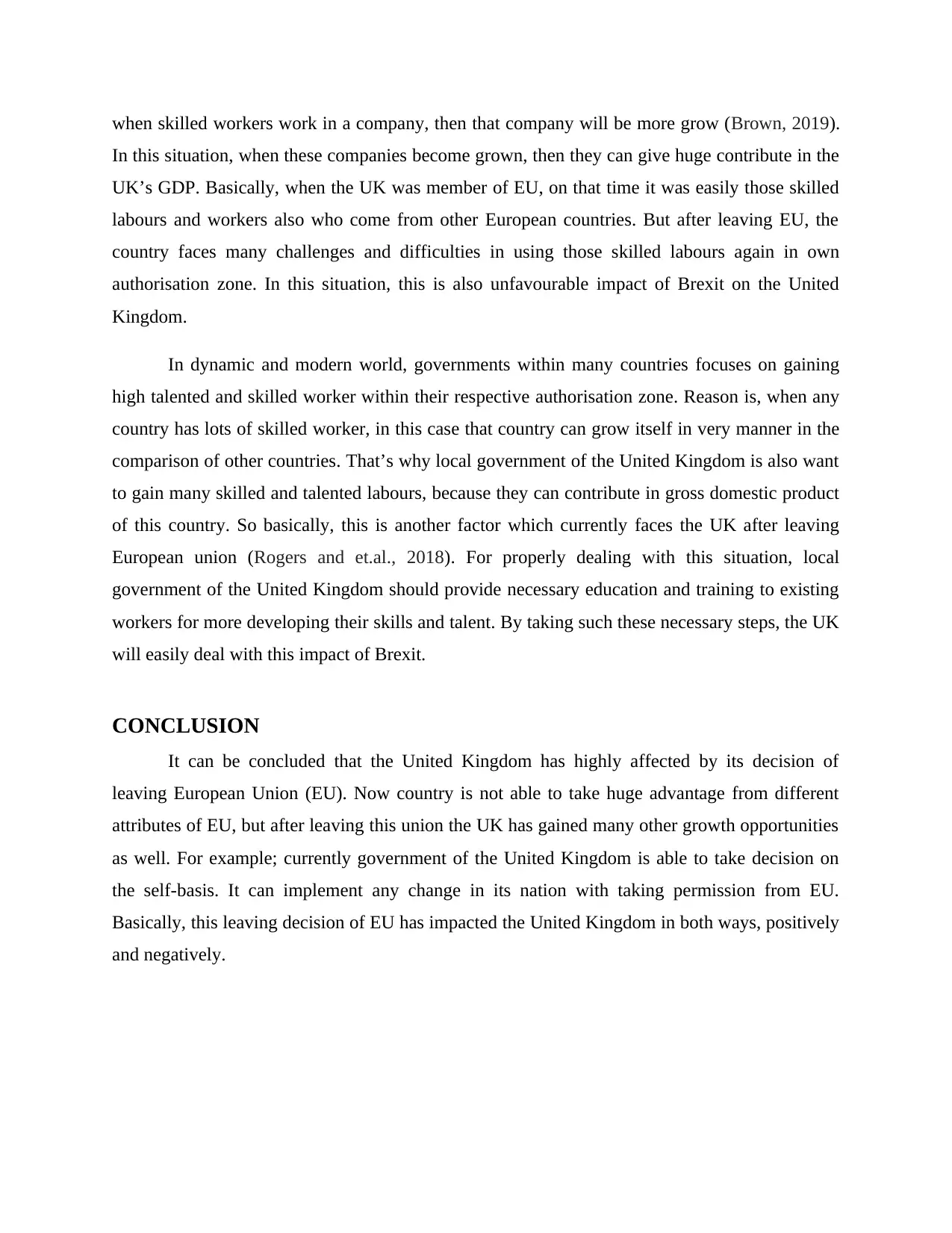
when skilled workers work in a company, then that company will be more grow (Brown, 2019).
In this situation, when these companies become grown, then they can give huge contribute in the
UK’s GDP. Basically, when the UK was member of EU, on that time it was easily those skilled
labours and workers also who come from other European countries. But after leaving EU, the
country faces many challenges and difficulties in using those skilled labours again in own
authorisation zone. In this situation, this is also unfavourable impact of Brexit on the United
Kingdom.
In dynamic and modern world, governments within many countries focuses on gaining
high talented and skilled worker within their respective authorisation zone. Reason is, when any
country has lots of skilled worker, in this case that country can grow itself in very manner in the
comparison of other countries. That’s why local government of the United Kingdom is also want
to gain many skilled and talented labours, because they can contribute in gross domestic product
of this country. So basically, this is another factor which currently faces the UK after leaving
European union (Rogers and et.al., 2018). For properly dealing with this situation, local
government of the United Kingdom should provide necessary education and training to existing
workers for more developing their skills and talent. By taking such these necessary steps, the UK
will easily deal with this impact of Brexit.
CONCLUSION
It can be concluded that the United Kingdom has highly affected by its decision of
leaving European Union (EU). Now country is not able to take huge advantage from different
attributes of EU, but after leaving this union the UK has gained many other growth opportunities
as well. For example; currently government of the United Kingdom is able to take decision on
the self-basis. It can implement any change in its nation with taking permission from EU.
Basically, this leaving decision of EU has impacted the United Kingdom in both ways, positively
and negatively.
In this situation, when these companies become grown, then they can give huge contribute in the
UK’s GDP. Basically, when the UK was member of EU, on that time it was easily those skilled
labours and workers also who come from other European countries. But after leaving EU, the
country faces many challenges and difficulties in using those skilled labours again in own
authorisation zone. In this situation, this is also unfavourable impact of Brexit on the United
Kingdom.
In dynamic and modern world, governments within many countries focuses on gaining
high talented and skilled worker within their respective authorisation zone. Reason is, when any
country has lots of skilled worker, in this case that country can grow itself in very manner in the
comparison of other countries. That’s why local government of the United Kingdom is also want
to gain many skilled and talented labours, because they can contribute in gross domestic product
of this country. So basically, this is another factor which currently faces the UK after leaving
European union (Rogers and et.al., 2018). For properly dealing with this situation, local
government of the United Kingdom should provide necessary education and training to existing
workers for more developing their skills and talent. By taking such these necessary steps, the UK
will easily deal with this impact of Brexit.
CONCLUSION
It can be concluded that the United Kingdom has highly affected by its decision of
leaving European Union (EU). Now country is not able to take huge advantage from different
attributes of EU, but after leaving this union the UK has gained many other growth opportunities
as well. For example; currently government of the United Kingdom is able to take decision on
the self-basis. It can implement any change in its nation with taking permission from EU.
Basically, this leaving decision of EU has impacted the United Kingdom in both ways, positively
and negatively.
⊘ This is a preview!⊘
Do you want full access?
Subscribe today to unlock all pages.

Trusted by 1+ million students worldwide
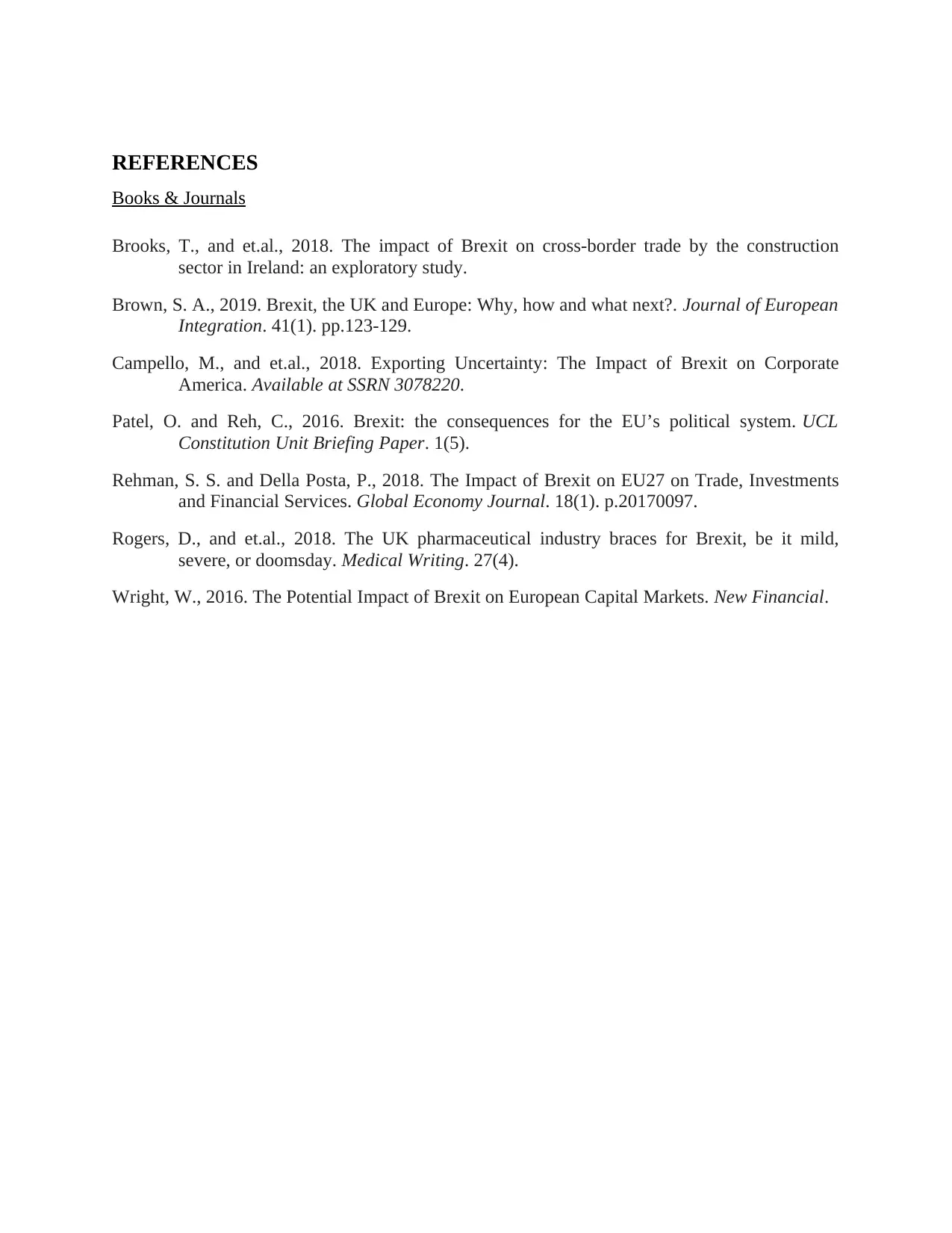
REFERENCES
Books & Journals
Brooks, T., and et.al., 2018. The impact of Brexit on cross-border trade by the construction
sector in Ireland: an exploratory study.
Brown, S. A., 2019. Brexit, the UK and Europe: Why, how and what next?. Journal of European
Integration. 41(1). pp.123-129.
Campello, M., and et.al., 2018. Exporting Uncertainty: The Impact of Brexit on Corporate
America. Available at SSRN 3078220.
Patel, O. and Reh, C., 2016. Brexit: the consequences for the EU’s political system. UCL
Constitution Unit Briefing Paper. 1(5).
Rehman, S. S. and Della Posta, P., 2018. The Impact of Brexit on EU27 on Trade, Investments
and Financial Services. Global Economy Journal. 18(1). p.20170097.
Rogers, D., and et.al., 2018. The UK pharmaceutical industry braces for Brexit, be it mild,
severe, or doomsday. Medical Writing. 27(4).
Wright, W., 2016. The Potential Impact of Brexit on European Capital Markets. New Financial.
Books & Journals
Brooks, T., and et.al., 2018. The impact of Brexit on cross-border trade by the construction
sector in Ireland: an exploratory study.
Brown, S. A., 2019. Brexit, the UK and Europe: Why, how and what next?. Journal of European
Integration. 41(1). pp.123-129.
Campello, M., and et.al., 2018. Exporting Uncertainty: The Impact of Brexit on Corporate
America. Available at SSRN 3078220.
Patel, O. and Reh, C., 2016. Brexit: the consequences for the EU’s political system. UCL
Constitution Unit Briefing Paper. 1(5).
Rehman, S. S. and Della Posta, P., 2018. The Impact of Brexit on EU27 on Trade, Investments
and Financial Services. Global Economy Journal. 18(1). p.20170097.
Rogers, D., and et.al., 2018. The UK pharmaceutical industry braces for Brexit, be it mild,
severe, or doomsday. Medical Writing. 27(4).
Wright, W., 2016. The Potential Impact of Brexit on European Capital Markets. New Financial.
1 out of 7
Related Documents
Your All-in-One AI-Powered Toolkit for Academic Success.
+13062052269
info@desklib.com
Available 24*7 on WhatsApp / Email
![[object Object]](/_next/static/media/star-bottom.7253800d.svg)
Unlock your academic potential
Copyright © 2020–2026 A2Z Services. All Rights Reserved. Developed and managed by ZUCOL.




